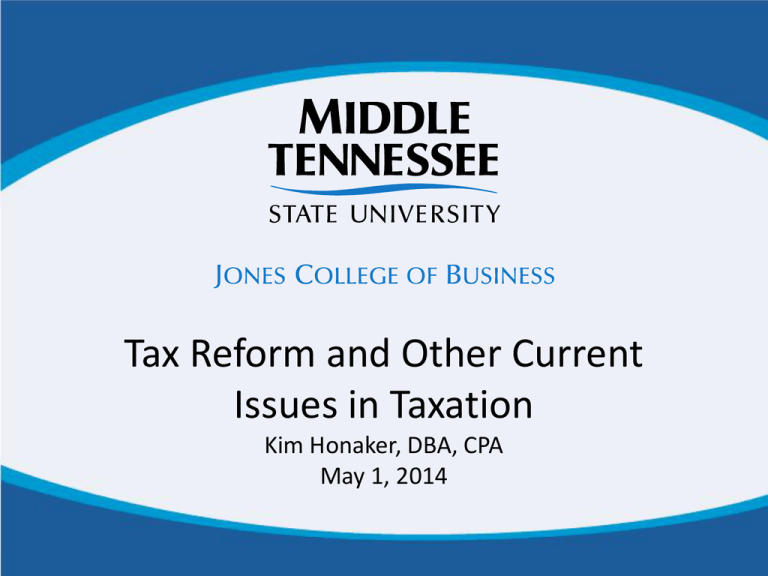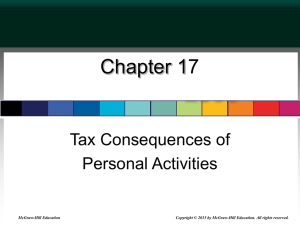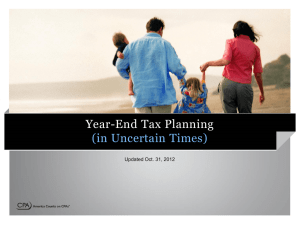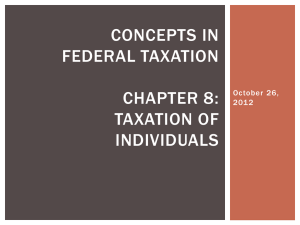Income Tax
advertisement

Tax Reform and Other Current Issues in Taxation Kim Honaker, DBA, CPA May 1, 2014 AGENDA • Tax Reform - Chairman Camp’s proposal – Overview of “Tax Reform Act of 2014” – Impact exercise – quantifying change • 2014 Update – Tax Extenders – Schedule UTP reporting Tax Reform Act of 2014 • Released February 26, 2014 – Full draft is 979 pages – Section-by-Section Summary is available (194 pages) – Technical Explanation from the Joint Committee on Taxation (JCT) also available (Title I for individual section is 138 pages) • Goals of reform – Make tax code simpler and fairer for families and employers – Strengthen the economy and therefore create more jobs. • Anticipated benefits – Create 1.8 million new private sector jobs – Allow 95% of taxpayers to claim standard deduction while minimizing taxes – Strengthen economy and increase GDP by up to $3.4 trillion – All without increasing the budget deficit Tax Reform Act of 2014 • Effective date – Changes generally take effect for tax year 2015 – Some changes phased in or phased out • Areas impacted – – – – International taxation Tax treatment of pass-throughs Business taxation Individual taxation • Joint Committee on Taxation issued two revenue estimates: 1. 2. A traditional “static” estimate A “dynamic” estimate which attempts to estimate the impact of reform on future economic growth Tax Reform Act of 2014 Google search of “chairman camp tax reform” turns up 30 pages of links. Sampling of coverage since release: • PWC, Deloitte, and other accounting firms • Media (on-line or in print), such as Forbes, WSJ, CNN, US News, Time, Washington Post • politico.com • newrepublic.com • accountingtoday.com • accountingweb.com • taxanalysts.com • taxfoundation.org • independentsector.org • sifma.org (Securities Industry and Financial Markets Association) • rila.org (Retail Industry Leaders Association) • semiconductors.org (Semiconductor Industry Association) • National Association of Realtors Key Individual Proposals • Replace existing tax brackets (7 total) with two brackets (15% and 25%) • Create 10% surtax for certain income earned by high income taxpayers • Increase standard deduction • Eliminate personal exemption • Eliminate preferential rate associated with qualified dividends and long-term capital gains • Repeal deduction for state and local taxes • Reduce loan cap on deductible mortgage interest from $1 million to $500k • Limit deductible retirement savings • Simplify education incentives • Repeal numerous tax credits • Repeal and/or modify various deductions, exclusions, and provisions Key Individual Proposals • Tax rates – 10% on taxable income (TI) < $35,600 ($71,200 joint) • Phased out for taxpayers with MAGI over $250,000 ($300,000) – 25% on taxable income above those amounts – 10% additional surtax on Modified Adjusted Gross Income (MAGI) above $400,000 • MAGI = all income subject to 10%/25% + excluded foreign earned income (or income from US territories) + tax-exempt interest + various tax-exempt benefits • Note that certain types of income, such as qualified domestic manufacturing income, will not be subject to the 10% surtax – All brackets indexed for inflation using a “chained CPI” – Individual AMT is eliminated Key Individual Proposals • Investment Income – No longer a preferential rate on long-term capital gains – Non-corporate taxpayers entitled to above-the-line deduction equal to 40% of adjusted net capital gain (net of 15% for most taxpayers – 60% at 25% rate) – Exclusion on gain on sale of principal residence remains but with changes to holding period requirement, how often exclusion can be used, and phase-out. – No change to 3.8% Net Investment Income tax enacted as a result of Affordable Care Act Key Individual Proposals • Education-Related Incentives – Consolidates Hope credit, lifetime learning credit, tuition deduction, and temporary American Opportunity Tax credit (AOTC) into a permanent AOTC • Maximum credit and phase-outs similar to current AOTC – No significant changes to • Deduction for work-related education • Gift tax exclusion for tuition payments • Tax-free 529 savings plans Key Individual Proposals • Other Deductions – Increased standard deduction of $22,000 (joint) or $11,000 (single). • Phased out when MAGI > $513,600 (married) or $356,800 (other) • Single filers with at least 1 qualifying child can claim an additional deduction of $5,500 (even if itemize) – Additional deduction is phased out dollar for dollar when AGI exceeds $30k – Personal exemption deduction eliminated – No deduction (above-the-line or itemized) for an employee’s employment related expenses Key Individual Proposals • Other Deductions (continued) – Deductions for taxes not associated with a trade or business no longer allowed • State income or sales & use tax • Real property and personal property tax – Mortgage interest remains deductible, but $1 million limit reduced to $500k over a period of 4 years – Charitable contributions remain deductible, but would be subject to a 2% AGI floor • Additionally, there would be some modification to limits placed on deductibility (fair value vs. adjusted basis, AGI % limitations) • Elimination of special rule allowing 80% deduction for amount paid for the right to purchase college athletic tickets. Key Individual Proposals • Other Deductions (continued) – – – – – No deduction for personal casualty losses No deduction for tax preparation fees No deduction for medical expenses No deduction for moving expenses No deduction for alimony payments (and no income inclusion on the other side) – Removal of existing 2% floor on miscellaneous itemized deductions – Removal of existing phase-out of itemized deductions for higher income taxpayers – No exclusion for employee achievement/service awards Key Individual Proposals • Other Credits – – – – – – – – Eliminates dependent care credit Eliminates adoption credit Eliminates residential energy efficiency credit Eliminates alternative fuels vehicle credit Eliminates health insurance credit Eliminates first-time home buyers credit Modifies earned income tax credit Expands the child tax credit • Increases amount to $1,500 per child for children under 18 ($500 allowed for non-child dependents) • Amounts would be indexed annually for inflation • Significantly higher thresholds for phase-out Family 1: Estimated Impact Existing Rules for 2013: W-2 Schedule C/Sole Prop LT Gain on sale of stock Interest Gambling income Total Gross Income Alimony Education Deduction SE Tax Deduction AGI Std or Itemized Deduction Exemptions (3) Taxable Income Income Tax Child/Dep Care Exp Credit Child Tax Credit Total Income Tax SE Tax Total Tax Liability 49,500 118,940 (3,000) 1,245 4,500 171,185 16,000 1,800 8,403 18,630 11,700 26,203 144,982 30,330 114,652 20,521 600 19,921 16,806 36,726 Itemized Deductions Mortgage Interest Property Tax Charitable Contributions Sales Tax (using calculator) Gambling losses Misc ($1,410 before limits) Medical ($10,850 before limits) Itemized vs. Standard Deduction of $12,200 8,870 2,800 4,000 2,460 500 0 0 18,630 Family 1: Estimated Impact With Proposed Changes: W-2 Sole Prop LT Gain on sale of stock Interest Gambling income Total Gross Income Alimony Education Deduction SE Deduction AGI Std or Itemized Deduction Exemptions Taxable Income Income Tax Child/Dep Care Exp Credit Child Tax Credit Total Income Tax SE Tax Total Tax Liability 49,500 118,940 (3,000) 1,245 4,500 171,185 8,452 22,000 - 8,452 162,733 22,000 140,733 24,503 1,500 23,003 16,806 39,809 Itemized Deductions Mortgage Interest Property Tax Charitable Contributions Sales Tax Gambling losses Misc ($1,410 before limits) Medical Itemized vs. Standard Deduction of $22,000 8,870 0 0 0 500 1,410 0 10,780 Taxable Income increase of $26,081. Tax increase of $3,082, or 15.47% [(23,003-19,921)/19,921] Family 2: Estimated Impact Existing Rules for 2013: W-2 s Gain on sale of stock Interest Dividends Total Gross Income Moving expenses AGI Std or Itemized Deduction Exemptions (2) Taxable Income Total Income Tax Other Taxes Total Tax Liability 100,500 4,150 1,610 2,430 108,690 1,500 19,500 7,800 1,500 107,190 27,300 79,890 11,173 11,173 Itemized Deductions Mortgage Interest Property Tax Charitable (includes $800 for NCAA sports) Sales Tax Itemized 8,000 3,000 2,500 6,000 19,500 Family 2: Estimated Impact With Proposed Changes: W-2 s Gain on sale of stock Interest Dividends 100,500 4,150 1,610 2,430 Total Gross Income Capital Gain Exclusion Moving expenses AGI Std or Itemized Deduction Exemptions Taxable Income Total Income Tax Other Taxes Total Tax Liab 108,690 1,660 - 1,660 Itemized Deductions Mortgage Interest Property Tax Charitable (includes $800 for NCAA sports) Sales Tax Itemized vs. Standard Deduction of $22,000 8,000 0 0 0 8,000 107,030 22,000 - 22,000 85,030 10,578 10,578 Taxable Income increase of $5,140. Tax decrease of $595, or -5.33% [(10,57811,173)/11,173] Family 3: Estimated Impact Existing Rules for 2013: W-2 Sole Prop LT Gain on sale of stock Interest Gambling income Total Gross Income Education Deduction SE Deduction AGI Greater of Std or Item Ded Exemptions (4) Taxable Income Income Tax 32,500 102,685 (3,000) 215 1,000 Child/Dep Care Exp Credit (1,200) Child Tax Credit Total Income Tax SE Tax Total Tax Liab (1,350) 133,400 3,450 7,254 17,777 15,600 10,704 122,696 33,377 89,319 14,188 11,638 14,509 26,147 Itemized Deductions Mortgage Prop Tax Charitable Sales Tax (using calculator) Misc ($608 before limits) Medical ($3,895 before limits) Itemized vs. Standard Deduction of $12,200 9,857 3,000 2,500 2,420 0 0 17,777 Family 3: Estimated Impact With Proposed Changes: W-2 Sole Prop LT Gain on sale of stock Interest Gambling income Total Gross Income Education Deduction SE Deduction AGI Std or Item Ded Exemptions Taxable Income Income Tax Child/Dep Care Exp Credit Child Tax Credit Total Income Tax SE Tax Total Tax Liab 32,500 102,685 (3,000) 215 1,000 133,400 7,297 22,000 - 7,297 126,103 22,000 104,103 15,346 (3,000) 12,346 14,509 26,855 Mortgage Prop Tax Charitable Sales Tax Misc ($608 before limits) Medical Itemized vs. Standard Deduction of $22,000 9,857 0 0 0 608 0 10,465 Taxable Income increase of $14,784. Tax increase of $708, or 6.08% [(12,34611,638)/11,638] Reconciliation of Change in Tax Tax calculated under existing rules Rate change on ordinary income Rate change on dividend income Rate change on capital gain income Capital gain exclusion Decrease in moving expenses Decrease in alimony Decrease in education exp. deduction Increase in SE tax deduction Increase in std/item. deductions Decrease in personal exemptions (3/2/4) Decrease in dependent care credit Increase in child tax credit Tax calculated under new rules Percentage Change in Income Tax Family 1 19,921 (2,538) N/A N/A N/A N/A 4,000 450 (12) (843) 2,925 600 (1,500) 23,003 Family 2 11,173 (2,538) 243 415 (415) 375 N/A N/A N/A (625) 1,950 N/A N/A 10,578 Family 3 11,638 (2,538) N/A N/A N/A N/A N/A 863 (11) (1,056) 3,900 1,200 (1,650) 12,346 15.47% -5.33% 6.08% Key International and Pass-Through Proposals International Pass-Throughs • • • • • • • • Designed to move US toward territorial system for taxing US multinational corporations 95% Dividends Received Deduction (DRD) on foreign dividends received by US corporations One-time tax on all untaxed foreign earnings held overseas (deemed repatriation) Taxation of intangible income from foreign markets at a rate of 15% (subject to phase-in) CFC look-through rules made permanent Thin cap rules limiting interest deductions And other changes • • • • • • • Ordinary income treatment for “carried interest” Changes to real estate investment trust (REIT) rules Removal of 7 year limit on gain recognition for contributed property Changes to partnership IRS audit procedures Repeal of technical terminations Repeal of guaranteed payment treatment Changes to applicability of selfemployment tax to earnings of limited partners and S-corp. shareholders (looks at material participation as a trigger) And other changes Key Business Proposals • Flat 25% tax rate phased in over 5 years • Phase-out Section 199 deduction, with eventual elimination • Eliminate MACRS and establish longer depreciable lives • Section 179 expensing made permanent at $250k (phaseout begins at $800k investment) • Increase Section 197 amortization to 20 years • Amortize certain advertising expenses over 10 years • Amortize research expenses over 5 years • Make permanent a modified research credit • NOL carryback/carryover limited to 90% of taxable income • Eliminate entertainment deduction • LIFO and LCM repealed • Like-kind exchange treatment repealed • Corporate AMT repealed • Various other changes Tax Extenders • Temporary provisions impacted include R&D credit, look-through treatment, Section 179, bonus depreciation, tuition deduction, state and local sales tax deduction, and various others • Early April - Senate Finance Committee passed tax extenders package (typical first step) – Extends expired or expiring provisions for two years or longer – Approximately 55 provisions considered • Full senate expected to vote on package next • Passage by Senate would put pressure on the House – Ways and Means Committee version currently focuses on business extenders – Some concern that Chairman Camp’s version may ultimately address a few of the extenders and while letting others expire • Remember that extension of temporary provisions for 2012/2013 was not signed into law until January 1, 2013 Schedule UTP reporting • Mandatory IRS reporting of uncertain tax positions taken in corporate tax return and for which a reserve has been recorded in the audit financial statements – Applied to taxpayers with assets > $100 million for 2010 and 2011 – Applied to taxpayers with assets > $50 million for 2012 and 2013 – Applies to taxpayer with assets > $10 million for 2014 and later years Resources Tax Reform Deloitte (Producer). (2014). Camp Tax Reform Discussion Draft Unveiled: Key Proposals and Implications for Taxpayers [video webcast]. Retrieved from http://www.deloitte.com/view/en_US/us/Insights/Browse-byContent-Type/dbriefs-webcasts/e5ad0e7317f64410VgnVCM1000003256f70aRCRD.htm Joint Committee on Taxation (2014). Technical Explanation of the Tax Reform Act of 2014, A Discussion Draft of the Chairman of the House Committee on Ways and Means to Reform the Internal Revenue Code: Title 1 – Tax Reform for Individuals (JCX-12-14). Retrieved from http://waysandmeans.house.gov/uploadedfiles/jct_technical_explanation__title_i___individual__jcx_12_14 ___022614.pdf Pomerleau, K. & Lundeen, A. (2014, February 26). The Basics of Chairman Camp’s Tax Reform Plan. Retrieved from http://taxfoundation.org/blog/basics-chariman-camp-s-tax-reform-plan PricewaterhouseCoopers, 2014. Overview of Ways and Means Chairman Camp’s Tax Reform Discussion Draft. Retrieved from http://www.pwc.com/en_US/us/tax-services/publications/insights/assets/pwc-overviewways-means-chairman-camp-tax-reform-discussion.pdf PricewaterhouseCoopers, 2014. Ways and Means Chairman Camp Releases Tax Reform Discussion Draft. Retrieved from http://www.pwc.com/en_US/us/tax-services/publications/insights/assets/pwc-ways-meanschairman-camp-releases-tax-reform-discussion-draft.pdf Ways and Means Committee Majority Tax Staff (2014). Committee on Ways and Means Chairman Dave Camp Tax Reform Act of 2014 Discussion Draft Section-by-Section Summary. Retrieved from http://waysandmeans.house.gov/uploadedfiles/ways_and_means_section_by_section_summary_final_022 614.pdf Resources (continued) Tax Extenders Cohn, M. (2014, April 14). Tax Extenders in Limbo. Retrieved from http://www.accountingtoday.com/debits_credits/tax-extenders-in-limbo-70316-1.html Lee, B. (2014, April 10). What Will Congress Do with the 55 Expired Tax Extenders? Retrieved from http://www.foxbusiness.com/personal-finance/2014/04/10/what-will-congress-do-with-55-expired-taxextenders/ Lundeen, A. (2014, April 4). Senate Finance Committee Passes $85 Billion Tax Extenders Bill. Retrieved from http://taxfoundation.org/blog/senate-finance-committee-passes-85-billion-tax-extenders-bill Vest, C. (2014, April 23). Fate of Tax Extenders Bill Still Uncertain. Retrieved from http://associationsnow.com/2014/04/fate-tax-extenders-still-uncertain/ Schedule UTP Internal Revenue Service (IRS). (2013). 2013 Instructions for Schedule UTP. IRS Research Division, Washington, DC. Questions?









